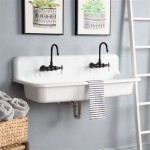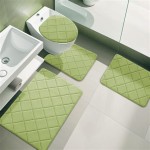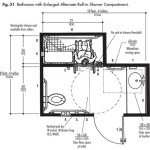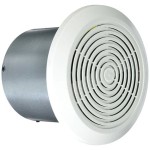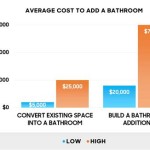How Much Does It Cost to Renovate a Bathroom?
Bathroom renovations are common home improvement projects, driven by desires for increased functionality, enhanced aesthetics, and improved property value. Understanding the financial implications of such a project is crucial for homeowners to ensure they can adequately budget and avoid unexpected financial strain. The costs associated with bathroom renovation can vary significantly based on various factors, including the size of the bathroom, the scope of the renovation, the materials chosen, and the location of the property. This document will provide a comprehensive overview of the various cost components involved in bathroom renovation projects.
Before delving into specific cost breakdowns, it's important to differentiate between different tiers of bathroom renovations. A basic renovation might involve replacing a few fixtures, such as the toilet and sink, and applying a fresh coat of paint. A mid-range renovation typically includes replacing all fixtures, updating the flooring, and potentially altering the layout slightly. A high-end renovation, on the other hand, can involve significant structural changes, high-end materials, and the incorporation of luxury features like a soaking tub, custom cabinetry, and advanced shower systems. The level of renovation chosen will greatly influence the overall cost.
Factors Influencing Bathroom Renovation Costs
Several factors directly impact the final cost of a bathroom renovation. These factors should be carefully considered when planning the project and obtaining quotes from contractors.
Size and Layout: The square footage of the bathroom is a primary determinant of cost. Larger bathrooms require more materials and labor. Altering the existing layout by moving plumbing fixtures can significantly increase costs due to the need to reroute pipes and electrical wiring. Keeping the existing layout can help minimize expenses.
Materials: The choice of materials has a substantial impact on the overall cost. High-end tiles, custom cabinetry, designer fixtures, and premium countertops will significantly increase the budget compared to more standard options. For example, natural stone tiles like marble or granite are significantly more expensive than ceramic or porcelain tiles. Solid wood cabinets cost more than those constructed from particleboard or MDF. The selection of these materials should reflect the homeowner's budget and desired aesthetic.
Labor Costs: Labor costs are a significant component of the total renovation expense. These costs can vary depending on the location, the contractor's experience, and the complexity of the project. Hiring licensed and insured professionals, while potentially more expensive upfront, can help avoid future issues and ensure the work is completed to code. Plumbers, electricians, tilers, and general contractors typically charge hourly or project-based rates. Obtaining multiple quotes from different contractors is advisable to ensure a competitive price.
Plumbing and Electrical Work: Plumbing and electrical work can represent a substantial portion of the renovation budget, especially if the project involves moving fixtures or upgrading the electrical system to accommodate new lighting or heated flooring. Hiring licensed plumbers and electricians is essential to ensure the work complies with local building codes and safety regulations. Older homes may require additional plumbing or electrical upgrades to meet current standards, which can further increase costs.
Permits and Inspections: Depending on the scope of the renovation, permits may be required from the local municipality. Permit fees vary depending on the location and the extent of the work being performed. Inspections are typically required to ensure the work complies with building codes. Failing to obtain necessary permits can result in fines and delays, so it is crucial to research and comply with local regulations.
Demolition and Waste Removal: The demolition process and the removal of old fixtures and materials can also contribute to the overall cost. Some contractors include demolition and waste removal in their overall price, while others charge it as a separate fee. If the homeowner chooses to handle demolition themselves, they must ensure they have the proper equipment and disposal methods to comply with local regulations.
Breaking Down the Cost Components
To provide a clearer understanding of the cost breakdown, a typical bathroom renovation can be divided into several key areas.
Fixtures (Toilet, Sink, Bathtub/Shower): Fixtures represent a significant portion of the budget. A standard toilet can range from $100 to $500, while a high-end, water-efficient model can cost upwards of $1,000. Sinks range from $50 for a basic pedestal sink to several hundred or even thousands of dollars for a designer vessel sink. Bathtubs and showers have an even wider price range, from a few hundred dollars for a basic acrylic tub to several thousand dollars for a high-end soaking tub or custom-tiled shower enclosure. The cost of installation for these fixtures must also be considered.
Cabinetry and Countertops: Bathroom cabinets and countertops can significantly impact the overall look of the space and also its price. Stock cabinets are the most affordable option, typically ranging from $100 to $500 per linear foot. Semi-custom cabinets offer more customization options and generally cost between $500 and $1,000 per linear foot. Custom cabinets provide the highest level of customization but can cost upwards of $1,000 per linear foot. Countertop materials also vary in price, with laminate being the most affordable option, followed by solid surface materials like Corian, and then natural stone like granite and marble, which are the most expensive.
Flooring: Flooring options for bathrooms include tile, vinyl, and laminate. Tile is the most popular choice due to its durability and water resistance. Ceramic and porcelain tiles are the most affordable options, ranging from $1 to $15 per square foot. Natural stone tiles, such as marble or slate, can cost upwards of $25 per square foot. Vinyl flooring is a budget-friendly option, ranging from $1 to $5 per square foot. Laminate flooring is also relatively inexpensive, but it is not as water-resistant as tile or vinyl. Installation costs for flooring can range from $3 to $10 per square foot, depending on the material and the complexity of the installation.
Lighting and Ventilation: Adequate lighting and ventilation are essential in a bathroom. Lighting fixtures can range from $50 for a basic vanity light to several hundred dollars for recessed lighting or a decorative chandelier. Ventilation fans are crucial for removing moisture and preventing mold growth. A basic ventilation fan can cost between $20 and $100, while a more powerful and quiet model can cost upwards of $200. Installation costs for lighting and ventilation can vary depending on the complexity of the wiring and ductwork.
Paint and Finishing: Paint and finishing touches can significantly impact the overall aesthetic of the bathroom. High-quality, moisture-resistant paint is recommended for bathrooms to prevent mold growth. The cost of paint can range from $20 to $50 per gallon. Other finishing touches, such as trim, baseboards, and hardware, can also add to the overall cost.
Cost Estimations Based on Renovation Scope
Providing accurate cost estimations is challenging due to the wide range of variables involved. However, general estimates can be provided based on the scope of the renovation.
Basic Renovation: A basic renovation, which involves replacing a few fixtures and applying a fresh coat of paint, might cost between $3,000 and $7,000. This type of renovation typically involves minimal structural changes and focuses on cosmetic upgrades.
Mid-Range Renovation: A mid-range renovation, which includes replacing all fixtures, updating the flooring, and potentially altering the layout slightly, might cost between $7,000 and $15,000. This type of renovation involves more significant changes and requires the expertise of skilled tradespeople.
High-End Renovation: A high-end renovation, which can involve significant structural changes, high-end materials, and the incorporation of luxury features, can cost upwards of $15,000 and can easily exceed $30,000 or more. This type of renovation involves extensive planning and requires the expertise of experienced designers and contractors.
These estimates are intended to provide a general idea of the potential costs involved. It is crucial to obtain detailed quotes from multiple contractors to get a more accurate estimate for a specific project. The location of the property, the specific materials chosen, and the complexity of the work will all influence the final cost.
Homeowners should also factor in a contingency fund of approximately 10% to 20% of the total budget to cover unexpected expenses that may arise during the renovation process. This fund can help mitigate the risk of cost overruns and ensure the project stays on track. Common unforeseen expenses include hidden plumbing or electrical issues, structural damage, and material delays.

Bathroom Remodeling Costs In Dc 2024 Sweeten

How Much Does A Bathroom Remodel Cost 2024 Data Angi

Bathroom Remodeling Costs In New Jersey 2024 Sweeten Com

The Cost Of Bathroom Renovations In 2024

Bathroom Renovation Cost How Much To Budget For A Remodel

Bathroom Remodeling Costs In Chicago 2024

How Much Does Bathroom Renovation Cost In 2024 I Did It For 20 750

How Much Does A Bathroom Renovation Cost In 2024 The Property Tribune

2024 How Much Does A Bathroom Renovation Cost In

Understanding Small Bathroom Remodel Costs And How To Save
See Also

